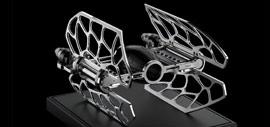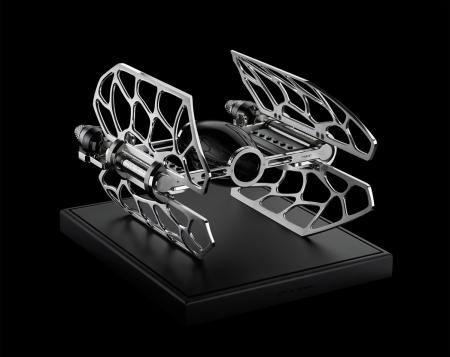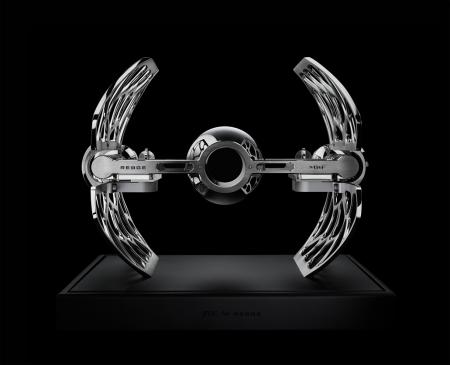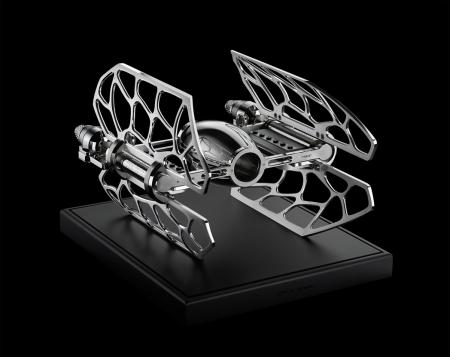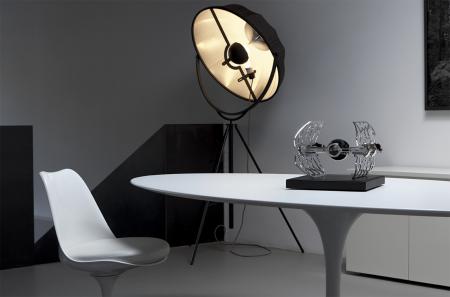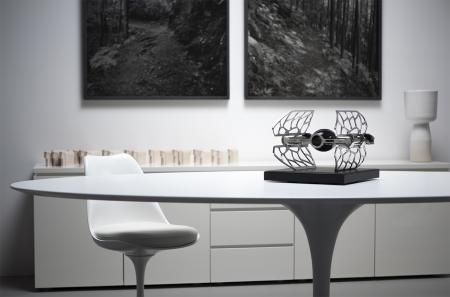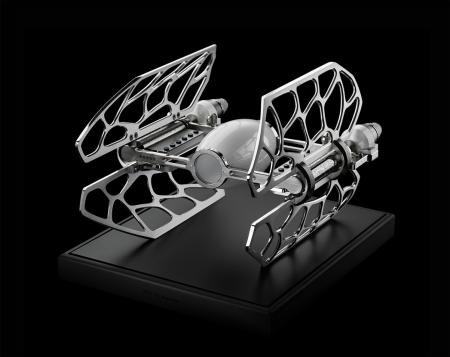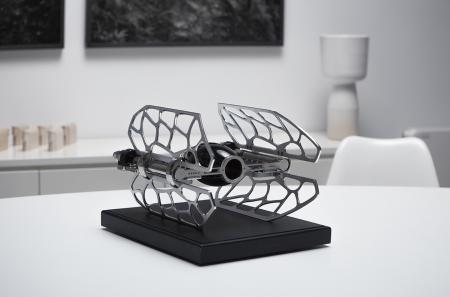MB&F MusicMachine 3: May the force of sound be with you
MB&F celebrates its tenth anniversary in 2015 with the tagline “A creative adult is a child who survived.” One film that children (and many adults) of all ages love is Star Wars and who could forget the frantic swarms of the Imperial fleet’s TIE fighters as they battle the Alliance. The TIE fighter-inspired MusicMachine 3 (MM3) is proof positive that both the child and the Force are still going strong within MB&F founder Maximilian Büsser – who was 10 years old when he first saw Star Wars in 1977.
While MusicMachine 3 may look as though it is more at home darting around in the silent vacuum of space, it is in the sound-propagating, air-rich atmosphere of Earth in which MM3 really displays its mettle. Those lattice-like vertical wings support and protect the dual music cylinders, each playing three melodies: the theme tunes from Star Wars, Mission Impossible, and James Bond on the right and The Godfather, Merry Christmas Mr. Lawrence, and The Persuaders on the left. Those side wings also play a vital role in propagating sound vibrations down from the combs to the naturally amplifying resonant base, manufactured by JMC Lutherie.
MM3 may appear to come from a galaxy far, far away in the future; however, its origins are much older and much closer to home. MusicMachine 3 features all of the traditional elements of a beautifully arranged, high-end mechanical music box. This should come as no surprise as it was developed and crafted according to MB&F’s design by Reuge, the Swiss music box manufacturer with 150 years of expertise and experience.
The music in MusicMachine 3 is powered by two independent movements mounted on the two tail sections. Each movement has its own winding key (disguised as thrusters), a mainspring barrel, horizontal cylinder with pins, and comb with hand-tuned teeth sounding each note. The cylinders play three melodies each. An air regulator in the form of a circular fan (resembling a rotating radar dish) governs the unwinding speed/music tempo of each cylinder.
To ensure the lateral symmetry of MM3, Reuge broke with music box convention to configure the two movements as mirror images of one another. This required a complete inversion of the design of the movement components and the movement architecture so that one cylinder rotates clockwise and the other anticlockwise.
MusicMachine 3 doesn’t just look as though it has flown in from a more advanced civilisation, it sounds like it as well. The majority of music boxes amplify sound through their wooden cases, much like guitars and violins do. MM3 is carefully designed to transmit the musical vibrations from the combs down through the two vertical side wings to its resonance base. This natural timber amplifier was developed by Jeanmichel Capt of JMC Lutherie, based in the Vallée de Joux, in the heart of Switzerland’s horological landscape.
MusicMachine 3 is a limited edition of 99 pieces: 33 pieces with white finish; 33 pieces with black finish; and 33 pieces with ‘chrome’ finish.
MusicMachine 3 in detail
MusicMachines – music boxes for the 25th century
Mechanical music boxes produce melodies by way of tuned teeth on a steel comb being plucked by pins on a revolving cylinder. Music box movements share many similarities with their horological counterparts, both technically and aesthetically: Energy derived from a coiled spring is transferred by a gear train, with the unwinding speed carefully regulated by a precision fan (similar to many minute-repeater regulators). High-end music box components are even finely finished similarly to high-end watch movements.
Since music boxes first appeared in the early 19th century, Switzerland, the home of fine watchmaking, became the hub of high-quality music box production. In 1865, Charles Reuge was a pioneer of the genre when he set up his first musical pocket watch shop in Sainte-Croix, located in the Jura mountains home of many legendary watches.
Nearly 150 years on, and still in Sainte-Croix, Reuge is the only remaining manufacturer of high-end music boxes in the world. Reuge’s collection has grown to offer both quintessentially classical pieces and contemporary designs – including a service for specially commissioned bespoke pieces. With the MB&F MusicMachines, Reuge has pushed the frontiers of music box design: MusicMachines belong more to the 25th century than the 21st!
Designed by MB&F and made by Reuge, the first MusicMachine was launched at Baselworld 2013. Building on the success of this initial collaboration, Reuge and MB&F joined forces in 2014 for MusicMachine 2 and again in 2015 for MusicMachine 3, which completes the trilogy.
MusicMachine 3’s sci-fi design
Reuge created MusicMachine 3 based on the Star Wars TIE fighter design proposed by MB&F and designer Xin Wang. The concept cleverly incorporates all of the essential music box features – musically tuned combs, pinned cylinders, winding mechanisms, mainspring barrels, and regulators – into a TIE fighter-style music machine. To optimise and amplify the sound created by MusicMachine 3, Jeanmichel Capt of JMC Lutherie developed MM3’s ingenious resonance base.
The melodies
While the look of MusicMachine 3 is very much Star Wars, its music is set in the epoch of the films and TV series of Büsser’s childhood: the 1960s and 70s. The right cylinder plays themes from Star Wars (1977), Mission Impossible (1960), and James Bond (1962), while the left plays themes from The Godfather (1972) by Nino Rota, Merry Christmas, Mr. Lawrence (1983) by Ryuichi Sakamoto, and The Persuaders (1971) by John Barry.
Mechanically recreating music
Once MB&F confirmed the melodies, a Reuge musician examined the tunes and identified the most recognisable passages from each. Work then began on recreating the music, keeping in mind that one cylinder contains the three melodies, while the other contains three other tunes, and that each cylinder’s pins plucks all of the notes from one 72-note comb.
Working out these two groups of three arrangements, each one around 35 seconds, and the multitude of notes that these entail – some notes are used by all three melodies, some notes are exclusive to just one melody – represents a considerable technical and artistic achievement in which the musician’s instinct tops any computer.
MusicMachine3’s engine room
The music box movements – containing combs, cylinders, winding mechanisms, mainspring barrels, and regulators – are fixed to two Geneva wave-decorated main plates (one each side) running from the “thruster” winders at the back to the front of the music cylinders.
The combs
The two combs lie flat beside each cylinder, each forming a unique pair containing the bespoke selection of 72 notes. The combs are hand-tuned from a unique steel alloy selected for its acoustic impact. For bass notes, the tooth is thickened by the traditional method of adding lead. A machine then tests the frequency of each tooth, and slivers of material are removed to accurately tune each note. The hand-operated tools that Reuge uses in this process have been developed in-house. Tiny transparent, synthetic feathers are added behind the bass note teeth, acting as dampers. Once the comb is attached to the main plate using heat-blued screws, the musician’s ear is required again for the concluding fine-tune!
The cylinders
The beautifully hand-finished cylinders gleam like a pair of imposing power reactors. The cylinders essentially contain the melodies’ ‘scores’, with as many as 1,400 precision-placed pins plucking the teeth of the comb as the cylinder revolves.
The Reuge musician determines precisely where to place each pin, each of which is shaved to ensure uniformity of length and then polished. Finally, hot resin is applied inside the cylinder, which, when hardened, rigidly fixes the pins to maximise sound quality. Once one melody is played, the cylinder moves along its long axis to align the right pins with the right teeth to play the next melody. Each melody corresponds to one complete revolution of the cylinder.
Winding keys and mainspring barrels
Frustums (truncated cones) resembling propulsion thrusters on each side of the tail section are actually winding keys that are linear with the mainspring barrels and cylinders. This is an unconventional configuration for music boxes, but MB&F’s daring design dictated it. One additional advantage is that the linear configuration allows a more efficient transfer of energy. These winding keys – a challenge for Reuge’s team to get just right – revolve as the barrels unwind and the cylinders turn.
Fan regulators
In the centre of the main plate are distinctive vertical circular panels. While these might look as though they could be radar dishes used for navigating an asteroid field, they are actually the cylinder speed regulators. When fully wound, the mainsprings have more torque so they tend to rotate the cylinders faster than when nearly unwound. To compensate, these circular fan air regulators provide exponentially more resistance when rotating faster than slower, allowing for a more constant revolution. A similar system is found in many minute-repeater watches.
Resonant base principles
Functioning by the principle of forced vibration, wooden soundboards traditionally feature on stringed instruments such as violins, guitars and pianos. The board is vibrated by the string at the same frequency, producing the same sound, the only difference being the timbre. While the same amount of energy is created irrespective of the board’s presence, a soundboard is more able to transform this energy into sound because of its greater surface area – the board can move a greater volume of air – creating a louder sound. On MusicMachine 3, energy is transmitted from the vibrating teeth down though the vertical side wings to the resonance base, which not only amplifies the sound, but underlines the beauty of the music. MusicMachine 3’s innovative base combines 350-year-old resonance spruce with 21st century composite materials like NomexTM honeycomb Kevlar.
350-year-old resonance spruce
MusicMachine 3’s soundboard base features timber from 350-year-old resonance spruce from the Risoux Forest in Switzerland, where cool summers and cold winters lead to slow tree growth, occasionally producing an extremely dense wood boasting superlative acoustic properties. Each resonant tree was selected by one man: lifelong ‘tree gatherer’ Lorenzo Pellegrini, who would climb trees like a squirrel and hug each trunk, in order to see if it was straight enough to create a sufficiently resistant as well as light soundboard.
Such is the criteria for selecting appropriate wood that only one in 10,000 spruce trees is good enough to feature in a JMC Lutherie guitar! The tree is cut down on a specific day in November when it is in its driest state. The wood is left to dry for a further five to ten years and then prepared at specialist sawmills. A primer is used to close the wood fibres before a non-penetrating varnish is applied.
MusicMachine 3: Technical Specifications
MusicMachine 3 is a limited edition of 99 pieces: 33 pieces with white finish; 33 pieces with black finish; and 33 pieces with ‘chrome’ finish
Dimensions and weight
Dimensions (with soundboard base): 400 mm long x 340 mm wide x 280 mm high
Total weight: Approximately 6 kg
Main hull – resonance base
Main body: aluminium with lacquer finish
Matte sections: protective varnishing
Gloss sections: White UV-resistant lacquer; black lacquer or ‘chrome’ anodised finish depending on version
Resonant amplifying base by JMC Lutherie: 350-year-old resonance spruce with 21st century composite materials like NomexTM honeycomb Kevlar.
Tail section – movement and finishing
MusicMachine 3 features two 3.72 movements (3 refers to number of melodies on each cylinder; 72 refers to number of notes on each comb); one movement is ‘right’ configured; one movement is ‘left’ configured (they rotate in opposite directions)
Main plate: polished brass decorated with Geneva waves. The main plate holds both movements; each movement includes a mainspring, cylinder, comb, and regulator
Mainsprings: wound via conical, grooved winding keys in the form of thrusters, in nickel-plated brass
Barrels: satin stainless steel
Regulator fans: nickel-plated brass
Cylinders: nickel-plated brass
Start/stop and repeat/continue functions
1 melody = 1 revolution of the cylinder
3 melodies per cylinder
Length of each melody: 35 seconds
Power reserve per cylinder: 15 minutes
Pins hand-applied and hand-polished
Length of pins: 1 mm; diameter of pins: 0.3 mm
Pins per right cylinder: 1,279; pins per left cylinder: 1,399
Combs: steel alloy and lead; 72 teeth per comb; each comb attached to nickel-plated brass vibration plate
Winding keys: nickel-plated brass
Melodies
Right cylinder – extracts from: ‘Star Wars’ (1977) by John Williams; ‘Mission Impossible’ (1960) by T Lalo Schifrin; ‘James Bond’ (1962) by Monty Norman
Left cylinder – extracts from: ‘The Godfather’ (1972) theme by Nino Rota; ‘Merry Christmas, Mr. Lawrence’ (1983) by Ryuichi Sakamoto; ‘The Persuaders’ (1971) main title by John Barry
MB&F – Genesis of a Concept Laboratory
10 years old, 10 calibres, countless highs, boundless creativity
In 2015, MB&F celebrates its 10th anniversary and what a decade it has been for the world’s first ever horological concept laboratory: 10 years of hyper-creativity; 10 remarkable calibres forming the base of the critically acclaimed Horological Machines and Legacy Machines for which MB&F has become renowned.
After 15 years managing prestigious watch brands, Maximilian Büsser resigned from his Managing Director position at Harry Winston in 2005 to create MB&F – Maximilian Büsser & Friends. MB&F is an artistic and micro-engineering laboratory dedicated to designing and crafting small series of radical concept watches by bringing together talented horological professionals that Büsser both respects and enjoys working with.
In 2007, MB&F unveiled their first Horological Machine, HM1. HM1’s sculptured, three-dimensional case and beautifully finished Engine inside set the standard for the idiosyncratic Horological Machines that have followed: HM2, HM3, HM4, HM5, HM6 and HMX – all Machines that tell the time, rather than Machines to tell the time.
In 2011, MB&F launched their round-cased Legacy Machine collection. These more classical pieces – classical for MB&F, that is – pay tribute to 19th century watchmaking excellence by reinterpreting complications from the great horological innovators of yesteryear to create contemporary objets d’art. LM1 and LM2 were followed by LM101, the first MB&F Machine to feature a movement developed entirely in-house.
Since then, MB&F alternate between launching contemporary, resolutely unconventional Horological Machines and historically-inspired Legacy Machines.
And there have been distinguished accolades to remember along the journey so far. To name a few, at the Grand Prix d’Horlogerie de Genève in 2012, MB&F were awarded the Public Prize (voted for by horology fans) and the Best Men’s Watch Prize (voted for by the professional jury) for Legacy Machine No.1. At the 2010 Grand Prix, MB&F won Best Concept and Design Watch for the HM4 Thunderbolt. Last but not least, in 2015 MB&F received for the HM6 Space Pirate a “Red Dot: Best of the Best” award – the top prize at the international Red Dot Awards.
Reuge – the premier manufacturer of music boxes still going strong after 150 years!
With exactly 150 years of expertise and experience, Reuge is positioned as the only premier producer of music boxes in the world today. While Reuge has a comprehensive collection of both classical and contemporary music boxes, the brand also prides itself on its ability to create bespoke pieces or limited series – like MusicMachines – for discerning clients.
The Reuge mentality is to respect tradition, but at the same time move forward with beautiful contemporary music boxes for the 21st century.
It was in 1865 that Charles Reuge established his first musical pocket watch shop in Sainte-Croix, Switzerland. Charles Reuge was a pioneer, managing to incorporate a musical cylinder and a miniature comb into a watch movement. His son Albert Reuge converted the family’s atelier into a small factory in 1886 and Reuge musical movements began to feature in the most unlikely of objects, including powder compacts and cigarette lighters.
Guido Reuge, who presided over the brand for much of the 20th century, built the current Reuge manufacture in Sainte-Croix in 1930 and expanded the company. In the 1960s and ?70s, Reuge diversified, taking over the manufacture and marketing of mechanical singing birds from Bontems and Eschle and also developed the skills and capacity to create or replicate virtually any melody. Since 2006, Kurt Kupper has been CEO of Reuge. Under his guidance the brand has developed a particular ability to customise and create bespoke music boxes.
JMC Lutherie – pioneers and creators of the Soundboard loudspeaker
Based in Le Brassus in Switzerland’s Vallée de Joux, JMC Lutherie was created in 2005 by director and founder Céline Renaud. JMC harnesses the incredible talents of luthier Jeanmichel Capt and the exceptional acoustic properties of 350-year-old resonance spruce sourced from the nearby Risoux Forest. A research and teaching partner at the Swiss Federal Institute of Technology, Lausanne (EPFL), and the School of Business and Engineering Vaud (HEIG-VD), Capt is a visionary maker of stringed instruments. He has taken time-honoured luthier techniques and fused them with a decidedly scientific approach exploring the audio-acoustic possibilities of resonance spruce.
Capt developed JMC’s pioneering beautiful-sounding Soundboard high-fidelity loudspeaker. Launched in 2007, the Soundboard features strategically-placed transducers on a cambered spruce membrane to produce an ultra-pure sound rich in timbre for a unique listening experience in your home. JMC has also used this venerable wood to create resonance trays and cylinders that showcase the full auditory splendour of minute repeater watches, plus a high-end speaker dock for smartphones.
